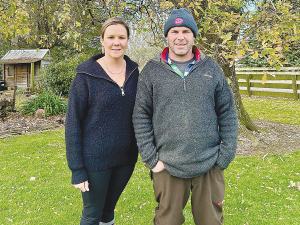Birth woes
OPINION: What does the birth rate in China have to do with stock trading? Just ask a2 Milk Company.
 Bevan and Jackie Jones, Southland, say they can now fast-track initiatives that they’ve been wanting to progress for years.
Bevan and Jackie Jones, Southland, say they can now fast-track initiatives that they’ve been wanting to progress for years.
The a2 Milk Company (a2MC) is providing $440,000 to 18 farms across Southland, Canterbury and the Waikato in the third round of its a2 Farm Sustainability Fund in New Zealand.
Established in 2022, the New Zealand section of the Fund is a collaboration between a2MC and Lincoln University supporting farm projects that demonstrate an integrated approach to a sustainable future and have a meaningful impact across the community and environment.
Applications were open to farmers supplying A1 protein free milk to Southland-based Mataura Valley Milk, which is 75% owned by a2MC or Synlait Milk, which is 205 owned by a2MC.
Applications for the current round of funding closed at the end of March and successful applicants were notified in mid-May. All applications to the Fund are evaluated by an independent Investment Committee, with each successful application able to receive funding of up to $35,000.
The independent Investment Committee is comprised of industry experts in regenerative agriculture, soil health, animal health and wellbeing and farming systems. Evaluation was based on criteria aligned to The a2 Milk Company’s sustainability objectives and key priority areas including:
The Fund received a record number of high-quality applications, reflecting strong interest from farmers across New Zealand. Grants in the current round have been made to projects including diverse riparian planting, alternative fertiliser use, diverse pasture implementation, wetland restoration and planting of trees to enhance biodiversity and provide shelter for animals.
Jaron McVicar, chief legal and sustainability officer at The a2 Milk Company says they are pleased that round three of the fund in New Zealand attracted so many applications from farmers to support their high impact projects.
“It is important to us that we continue to support dairy farmers in New Zealand through this initiative.”
Bevan and Jackie Jones, who farm in Southland and supply milk to Mataura Valley Milk have thanked the fund. “We can now fast-track initiatives that we’ve been wanting to progress for years.”
Their funded project involves planting native species and building a sediment trap to enhance water quality, promote biodiversity and sequester carbon; to provide shelter for the animals; and to create a picturesque landscape.
Eion Young, who also farms in South Otago, says they are pleased to receive a grant for an extension of a project that they received an award for in the previous round.
“Our project is a trial using alternatives to nitrogen fertiliser. We’ve engaged contractors to help implement and measure the changes to pasture and their impact on the farm business.
“We’re excited about the positive results from the first year and look forward to continuing the project to understand the long-term trends and how this could benefit our farm.”
Investment committee member John Reid says it’s an honour to be involved in a fund that can truly make an impact across dairy farming in New Zealand.
“The quality of applications and the deep interconnected nature of environmental function across a number of the projects serves as a testament to farmers and their long-term vision for enhancing the sustainability of their farms.”
Reid is a Senior Research Fellow at the University of Canterbury’s Ngāi Tahu Research Centre.
The Meat Industry Association of New Zealand (MIA) today announced that Chief Executive Officer Sirma Karapeeva has resigned from the role.
The winners of the 2026 Hawke’s Bay/Wairarapa Dairy Industry Awards were announced at the annual awards dinner held at Copthorne Solway Park in Masterton on Thursday evening.
Environment Southland is welcoming this week’s decision by the Environmental Protection Authority (EPA) to approve the release of Blaptea elguetai, a leaf‑feeding beetle that will help control the highly invasive Chilean flame creeper.
This March, the potato industry is proudly celebrating International Women’s Day on 8 March alongside the International Year of the Woman Farmer, recognising the vital role women play across every part of the sector — from paddocks and packhouses to research, leadership, and innovation.
Fruit trader Seeka posted a record profit and returns to shareholders in 2025.
Recent weather events in the Bay of Plenty, Gisborne/Tairawhiti, and Canterbury have been declared a medium-scale adverse event.
OPINION: Staying with politics, with less than nine months to go before the general elections, there’s confusion in the Labour…
OPINION: Winston Peters' tirade against the free trade deal stitched with India may not be all political posturing by the…